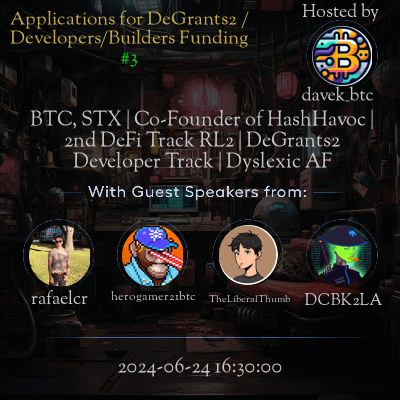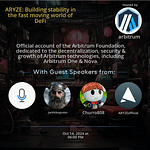This space is hosted by davek_btc
Space Summary
The Twitter space centered around a Development Agency’s discussions on community building, collaboration, and transitioning enthusiasts into developers. Emphasizing the importance of ecosystem contributions, the space highlighted onboarding and retaining developers. Global engagement through Stacks lab was emphasized, along with addressing gaps in developer transitions. The participants were encouraged to persist in their work, irrespective of program outcomes, and were informed about opportunities for collaboration within the developer community. The space also discussed Applications for DeGrants2, Developers, Builders Funding #3, grants, proposals, tracks, outreach, submission, and clarity.
Questions
Q: What was the focus of the Twitter space discussion?
A: The focus was on developer community building and collaboration.
Q: Which platform was highlighted for global developer engagement?
A: Stacks lab was mentioned as a platform for global developer engagement.
Q: What was emphasized regarding developer retention?
A: The importance of retaining developers through metric discussions was emphasized.
Q: What advice was given to developers regarding their work?
A: Developers were encouraged to persist in their work even if not selected for specific programs.
Q: What opportunities were promoted within the developer community?
A: Collaboration opportunities were promoted within the developer community for mutual support.
Highlights
Time: 00:02:53
High-Level Review: Discussion on the approach to reviewing projects, whether individually or from a high level.
Time: 00:04:35
Timeline and Breakdown Details: Explanation of the 55-business day timeline and the breakdown of projects.
Time: 00:06:47
Encouraging Multi-track Submissions: Advice to submit projects across multiple tracks if they cover different aspects for a comprehensive evaluation.
Time: 00:12:47
Utilizing Public Document: Advocacy for transparency by using a public document to enhance proposal submissions.
Time: 00:17:50
Track Leader Collaboration Insights: Discussion on how track leaders collaborate and communicate for effective project evaluation.
Time: 00:29:33
Developer Insights on Stacks: Experienced developers share their perspectives on the advantages and challenges of developing within the Stacks ecosystem.
Time: 00:50:33
Introduction to Stacks Lab: Detailed explanation of Stacks Lab’s role in supporting new developers through education, mentorship, and potential venture capital backing.
Time: 00:57:01
Importance of Review and Engagement: Final remarks stressing the significance of continuous review and community engagement for developers and project leads.
Key Takeaways
- Discussion on the significance of onboarding and retaining developers in the community.
- Highlighting Stacks lab as a platform for global developer engagement.
- Emphasizing the importance of filling gaps in developer transitions.
- Encouragement for developers to continue their work even if not selected for specific programs.
- Offering collaboration opportunities within the developer community for mutual growth.
Behind the Mic
for everybody to be able to thrive. So I don’t know if that’s helpful, david, but. Sorry, it’s just kind of like my observation. Yeah, no, I have thoughts on that, but I’m going to, I’ll swing it back to benny here and then I’ll circle back to that question there, or your comment. So I want to answer your question with a question. Do you know of any good, you, utility that can compete with passive bitcoin earning what competes with that? Yeah, that’s what I was thinking too. Absolutely hardly any fucking thing on top of that is I’ll be, this is. The dev track for D grants. Like I think like, I don’t know if they’re qualified to really answer that, bro. You know what I mean? Like, you’re in, like, the developer room. But you’re saying, what other. Why build on stacks? Right? So, like, so, for example, like, so I’m with you. So the reason why build on stacks for me was more of, like, you know. Right. So, so from a developer standpoint, for me, it was more like the onboarding was pretty seamless. Clarity had some significant advantages. The way that you could, how they’ve done clarity and the whole sandboxing, how you can run your local environment. The deployment was pretty straightforward. They had a variety of utilities and tooling that made it quite easy to get going versus in other ecosystems, it seems a little bit more choppier. and so that was kind of one of. Yeah, yeah. So the second thing that I was going to bring up is I’m cautiously optimistic about that no code clarity. thing. It seems like, from what I’m seeing from it, that you can code without knowing how to code. Like, you could just speak to it and, like, it pretty much, like, just draw things. They’re like more intelligently put contracts together for you, in my understanding, bro. Right. So, so let me push back on that just for a second, right? You don’t release clarity or put anything to chain if you don’t. So I think it’s like, they’ll give you, like, I think a good amount probably front end. Only or one and two. Like, if you say, like, create an NFT for me, they’ll load, like, an index HTML file in there and then show you, like, the back end or the. Like, the, whatever the clear contract is to do that, but they expect that you understand how HTML and javascript works on the other side of that right blockchain? Yeah. I’m cautiously optimistic. You got to understand how in javascript works on the other side of that, right? Blockchain just doesn’t make your front end magic, right? Yeah, exactly, but. So well, I guess what I’m saying is, like, so I have a little example, right, like, my experience is after talking with them, it was more of, like, hey, like, we’ll get you all the way up, but then at some point you’re going to need to take that extra step yourself, right? And so for a person who’s never built anything beyond, let’s say, just like a website. Right. as I can if he’s like, yeah. So I’m cautiously optimistic about this new thing they’re talking about, but I’m, like, a little bit like. You’re a little skeptical. I’m the same way. Yeah, definitely so. There’s got to be compromise, right? Yeah. So, like, so those are the stuff that from the standpoint why I decided to build on stacks right now. You know, I’m not saying that you can’t, you only, you have to build on stacks to be the most successful. There are plenty of different options, but stack seems to be, has made a lot of significant amount of progress in terms of that developer tooling, just know that there is. obviously some amount of trade off when it comes to learning curve and adoption and stuff like that, but that’s kind of my, my observation so far. Well, I’m super bullish, I’m super bullish on stacks. I think it’s a great option, for developers and development track. I got one question and maybe for David, maybe for Benny and David chime in if you want, looking at the staggered release of smart contracts, it could theoretically be coded in accordance with state regs across the union. And then is there a way to have points of presence, by location in different states to satisfy those disclosure requirements? to do that? That is a loaded question. I mean, I’m going to say this much. This is purely for educational purposes and not advice. I mean, anything is possible. With code, right? Like, think about the Mona Lisa was hit by Da Vinci adding layers of brush over and over until he saw the most beautiful painting in his eyes. Now, that being said, regulators don’t think like that, right? And I’m going to, I’m going to very carefully avoid this answer because like, there’s so many nuances to that, man. Yeah. I don’t, I don’t know. I think it also depends on what you’re trying to get legal coverage, and then what. Regulator would, I think the first step would be trying to at least pick a state which, you know, if it’s the lowest degree of difficulty state to do that and then once you can get past one regulator and one state, you know, maybe you can start USA. Okay, how do we replicate this to another state then, right? And then on and on and on. The problem with that then becomes just having that local point of presence, meaning having a team or organization in those States just adds logistics and costs to that, right? So everything is possible, but is it worth the value costs and then the reward risk at the end of the day, right? So from an architecture standpoint, that seems quite interesting, but just from a very practical operational standpoint, that just seems like a lot of overhead. I’m not saying it’s not true. Well, there are there are two questions, you know, they’re actually touching. One of them is your geography question, Scott. I got a lot of inquiries that have to do with, which regions are good to register. And of course, you tangle them along the lines of, like, Wyoming. I think it’s that, so, yeah, suggested possible, but some regions will give you no issues. But the second thing you mentioned about disclosure, and I mentioned this in chat. I think, almost everything I see that’s been publicly traded in auto stocks right now has no disclosure requirements, no aspect of what’s going on. It feels odd, if you buy up huge amounts or suddenly sell huge amounts, there’s no disclosure. And part of that is cultural around crypto because nobody wants to be identified and attributed to what’s going on. There’s no real KYC and AML going on. I’ve seen a number of [inominy] distributed or, you know, non-attributed securities just pop up and disappear. So, one double answer your question, we’re just at the very beginning. And I remember when the internet first began, nobody had a single, fuck about security, content transference or any of that. You know, there were no passwords widely used, but it needed to develop over time. And I think the layer you mentioned is, it should that be coming, it will get there. But honestly, putting myself in a copay, who runs 3 fully registered non-profits, its just very hard and difficult time. Scott just made his point about third-party use. Yeah. Thank you, David, for that. And, so in summation to that earlier comment by Beric, that’s something to work out over time. But I don’t think we, we should dissuade from the fact that there’s options, there’s a framework that we can build out sufficiently to remind ourselves. Those will be logistics, those will be some balance and everything. So, it’s not a super easy answer and so those are well-taken points, David so thank you. But meanwhile how else can we encourage developers, composers, and others of that nature? And Clarith, Aramärke, you mentioned one thing I thought is useful. And any, all of the chains can amend their future disclosures, but adding more details then is something to be considered. But I think that any working framework within defined jurisdiction, it will crop up. But not necessarily, will we see it as yet. And that’s just my comments to add. Clarith, you mentioned some details to be presumed, bankrupt, or already good. But shouldn’t we envision claris where jurisdiction matters lower than that as we develop. But for now, they excitedly putting out the framework quite well in my opinion. So, I’m happy even to be here. And for every other person tracking contracts and that. It’s a healthy progress, from seeing, in such time. They’ve done the amendments, whereby the cost might be added onto certain aspects, I’m not sure what they say. I will leave off, and others combining or whatever was working back roads of life. Thank you all, thank you very much. And David on projects pops up, some calls from me, thank you, and thank you guys for the feedback and the responses. As communities we gain from that hang out. That said, any questions, or benny last words. I want to positively present any today, and developers and dev track they are welcome, come anytime. That’s wondering, also seeking out as mention earlier all parties representing Stacks Karl and DGrants, all be contributing and happy for such organizers combos. And with that, I’ll leave off now, thanks. So as a community developer track, this could be something that could be obviously parlayed and turned into something. So, you know, that’s the first that I thought about it when you mentioned here, but I do think there’s some quite a bit of value there. So I think we should be, you know, encouraged to see what’s being created from D grants. And so Dgrants is creating a lot for the community. So, you know, inside and outside, regardless of how it comes out, I think there’s a lot of good stuff here. So super excited. Reach out to any of the stewards, any of the tracks, there’s multiple remaining tracks this week. Obviously get your, you know, obviously encouraging any and all to submit their applications and best of luck to everyone. And even if you don’t get it, I’d still encourage you to continue to move forward. It might be a little slower, but it’s still, I think the ecosystem needs developers, it needs people to put in that work regardless of a D grant or a critical bounty or anything. If you need collaboration, reach out to, and I’m just shilling my own self apparently, but if you need any collaboration, me and my and the hash havoc team are happy to collaborate. I’m sure all a lot of developers on the space are happy to collaborate, so if you need something, just reach out, you know, obviously don’t want anyone to be deterred because they didn’t get granted, but I’m wishing everyone the best luck and so, yeah, that’s it for today. I’ll see you guys on all the next spaces and have a good Monday. All right, thank you everybody. Thank you, David. All right, you’re welcome. All right, bye, hero. Bye Sam. Bye Dan, everybody. See you guys later.







